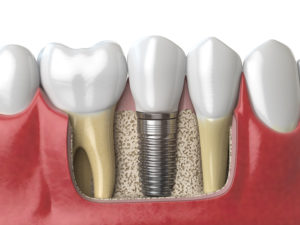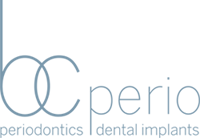 Unlike living oral structures, a tooth implant is not prone to developing cavities or gum disease. A tooth implant (or dental implant) consists of a titanium prosthetic that replaces the roots of teeth and a restoration or prosthetic that is attached to its abutment. The materials used to make restorations and prosthetics, such as porcelain and metal, along with the implant’s titanium structure are resistant to oral disease.
Unlike living oral structures, a tooth implant is not prone to developing cavities or gum disease. A tooth implant (or dental implant) consists of a titanium prosthetic that replaces the roots of teeth and a restoration or prosthetic that is attached to its abutment. The materials used to make restorations and prosthetics, such as porcelain and metal, along with the implant’s titanium structure are resistant to oral disease.
While a tooth implant and its attached restoration or prosthetic are made from disease-resistant materials, it doesn’t mean that patients can forego important oral hygiene practices or routine dental care. If you have a tooth implant, it is very important to practice thorough oral hygiene including flossing and visiting your oral healthcare provider for frequent checkups and cleanings.
Can oral health conditions affect a tooth implant?
While dental implants are resistant to disease, that doesn’t mean they can’t be negatively affected by diseased oral structures. The bone and gums support dental implants. If bone or gums develop disease, it can lead to implant failure.
A tooth implant is embedded into the jawbone. Over time, bone will literally fuse to the implant’s structure. This process is what makes a tooth implant so long lasting and durable. When the structures that support dental implants develop disease or deteriorate, an implant will not be able to function as it should.
Keeping your bone and gums healthy is paramount to enjoying a long lasting replacement tooth.
How do I care for dental implants?
You will care for dental implants similarly to how you care for biological teeth. The restorations and fixed prosthetics attached to dental implants should be brushed and flossed regularly. Brushing and flossing will remove remnants of food and control the development of oral bacteria.
Since your tooth implant relies on bone for support, you should schedule regular checkups and cleanings. Routine checkups can reveal if you have issues that might affect a dental implant such as gum disease and bone atrophy. Catching problems as early as possible can help protect your investment in your replacement teeth.
To learn more about dental implants, contact our team at BC Perio today to reserve a tooth replacement consultation.






